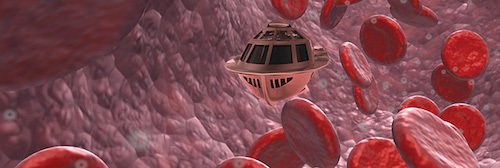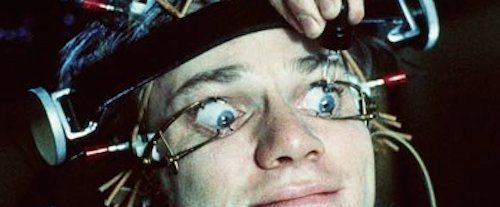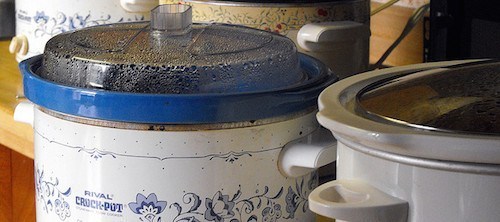Nicholas Carr's Blog, page 33
May 7, 2014
Honey, they shrunk the future
The New York Times interviewed some Silicon Valley boffins about their visions of our technological future. Here’s a representative sample of the replies:
Marc Andreessen: “Hundreds or thousands of drones flying to and fro for all kinds of reasons. Getting a top-end college education without going to a physical campus. Cars driven by computers instead of humans.”
Clara Shih: “Implantable chips that monitor the number of steps we take, hours we sleep, all of our vital signs, blood chemistry and...
May 5, 2014
Transparency through opacity
One of the topicsof my forthcoming book, The Glass Cage, is the riseof “technology-centered automation” as the dominantdesign philosophy of computer engineers and programmers. The philosophy gives precedence to the capabilities of technology over the interests of people. One of its governing characteristics is opacity, the hiding of the workings of an application or system behind a “user-friendly” interface. In an interview with VVVNT, the New Zealand artist and engineer Julian Oliver, coauth...
May 1, 2014
Sharecropping for Coursera
Coursera, the fast-growing, for-profit online education company, has become, as the Wall Street Journal put it, “an investor’s pet.” It has pulled in $85 million in venture funding over the last two years, attracting big-name investors like Kleiner Perkins and the World Bank’s VC arm, LearnCapital.
Those millions aren’t enough, apparently, to pay translators to help the company extend its online courses, or MOOCs, into foreign markets. Instead, Coursera is taking the digital sharecropping rout...
April 29, 2014
Identity overload
“With social media, the compelling opportunities for self-expression outstrip the supply of things we have to confidently say about ourselves,” writes Rob Horning. “The demand for self-expression overwhelms what we might dredge up from ‘inside.’”
My index finger is itching to give thata +1.
The struggle with the limits of what’s“inside” — the struggle with the limits ofpersonality — has long been thesource of the best art. We tend to characterizeart as “self-expression,” but that’s really more...
April 28, 2014
Virtuality, net neutrality, privacy: 1850
From Nathaniel Hawthorne’s The House of the Seven Gables:
“Yes, my dear sir,” said Clifford, “it is my firm belief and hope that these terms of roof and hearth-stone, which have so long been held to embody something sacred, are soon to pass out of men’s daily use, and be forgotten. Just imagine, for a moment, how much of human evil will crumble away, with this one change! What we call real estate — the solid ground to build a house on — is the broad foundation on which nearly all the guilt of...
April 27, 2014
On dualities, digital and otherwise
From Lance Strate’s trenchant 2008 article “Studying Media as Media“:
McLuhan’s emphasis on media effects has led some of his critics to label his approach as technological determinism. Technological determinism is a straw man used to caricature McLuhan as some sort of media Calvinist, and to dismiss his arguments without serious consideration. After all, most people get upset at the denial of free will, in theory as well as in practice. …
Free will does not mean freedom from limits, constraint...
April 16, 2014
Big data and the new behavioralism
In his book Social Physics, MIT’s Sandy Pentland argues that the collection of “big data” on people’s associations and behavior offers a way not only to gain a better understanding of society but to engineer society to be more productive, creative, and harmonious. I review the book in the new issue of MIT Technology Review. Here’s a bit from the review:
Even if we assume that the privacy issues can be resolved, the idea of what Pentland calls a “data-driven society” remains problematic. Social...
April 15, 2014
Technology below and beyond
“Neither helplessness nor unbounded enthusiasm and indifference to consequences would have allowed humans to inhabit the earth for very long,” observed Bruno Latour in a speech in Copenhagen in February. “Rather a solid pragmatism, a limited confidence in human cunning, a sane respect for the powers of nature, a great care invested to protect the fragility of human enterprise — these appear to be the virtues for dealing with first nature. Care and caution: a totally mundane grasp of the dange...
Seeing through Glass
The War of the Eyeballs begins today, with the initial public offering of Google Glass. To mark the occasion, I give you my all-time favorite Marshall McLuhan quote:
Once we have surrendered our senses and nervous systems to the private manipulation of those who would try to benefit by taking a lease on our eyes and ears and nerves, we don’t really have any rights left.
Just a heads-up.
April 13, 2014
The joy of cooking
From Max Levchin:
I relax by fine-tuning various kitchen processes and recipes using approaches borrowed fromgenetic algorithms. I approach a recipe as if it were a genome where every ingredient and process in the recipe is a gene that I modify randomly. I use a computer program so the modifications are truly random. I basically recombine the genetic makeup of the best recipes over and over again until I come up with what tastes the best.
It never really struck me before, but I do something ver...












